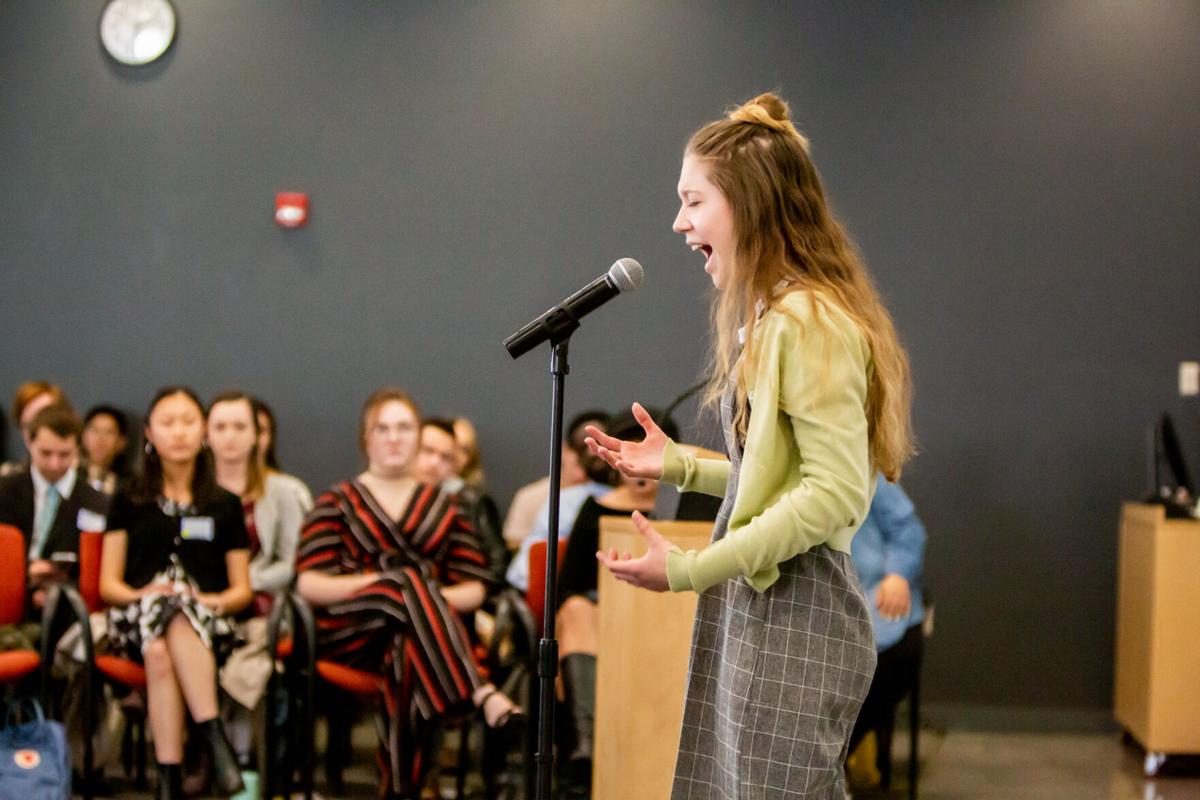On a cold, Wednesday morning last January, some of the best-known entertainers in the world gathered at the U.S. Capitol to celebrate the inauguration of a new American President.
Lady Gaga sang that day. So did Garth Brooks, Bon Jovi and Justin Timberlake, but the day’s biggest star wasn’t one of them. It was a young, little-known Black woman in a yellow coat.
Her name was Amanda Gorman and the 22-year-old electrified America by … drumroll, please … reciting poetry!
Gorman needed just six minutes to present her original poem, “The Hill We Climb,” and by the time she finished she had become one of the best-known authors in the world.
Clearly it was a big day for her, but it was an important moment for poetry, too.
“She reminded us how moving, how powerful poetry can be,” said Tyler Meier, Executive Director of the University of Arizona Poetry Center. “Poetry was designed to be an oral art form. Hearing it out loud always gives us a deeper, broader experience than reading it. It’s like music. Reading it is one thing. Hearing it is quite another.”
We mention these things because they frame the news that the Poetry Center has been selected to manage the “Poetry Out Loud” program throughout Arizona.
Established in 2005, Poetry Out Loud is an educational program that attracts some 3 million students a year from high schools across the nation. The Arizona Commission on the Arts had administered our statewide program since 2008. The commission handed the reins to the Poetry Center this fall.
“One of the things we’d like to do is increase participation,” Meier said, “and we’re hoping people like Amanda Gorman might inspire other young people who would also like to be heard.”
In most cases, individual high schools opt in to the Poetry Out Loud program as part of their curriculum. Its natural home is in the English Department, but the program also involves history, interpretation, memorization, and public speaking.
Registration is open through Oct. 31. The program starts in earnest next month.
“Most of the teaching and coaching begin in November,” said Gema Ornelas, the Education Program Manager for the Poetry Center. “That’s when we start helping students select poems and pair them with coaches and mentors.”
This is not an exercise in writing, Ornelas said. Students choose from a list of 1,100 published poems and – ideally – find two that are meaningful to them.
Teachers and coaches then work with each student to learn more about the poet, what the poet was trying to say, and how those thoughts might be interpreted today.
Once the poem is memorized, coaches help students find the right pacing, spacing and inflection points to best perform that piece of poetry – out loud.
“The teaching and coaching component is huge,” Ornelas said, “but the fun of it is the contest that begins in January. It starts with competitions in the classroom, and then goes to school-wide competitions in January.”
Regional competitions are scheduled for February, with the Arizona finals set for some time in March.
Ornelas does not yet know if the statewide competition will be virtual, as it was this year, or in-person.
She does know this: the winner will move on to the nationwide finals, where the top three presenters will be rewarded prizes of $20,000, $10,000 and $5,000.
“It’s really a great opportunity, for lots of reasons,” Ornelas said. “To be in the room for those competitions in the spring …and see the sense of accomplishment in the faces of the students …well, it’s pretty moving.”
Educators can register for the program by visiting the Poetry Center website: poetry.arizona.edu/education/k-12-youth/poetry-out-loud
If there are students who would like to participate in Poetry Out Loud but attend schools where it is not offered, Ornelas suggested they call the Poetry Center directly at 1-520-626-3765
Dedicated by Robert Frost in 1960, the Poetry Center is well-established in the world of poetry. With its expanded role in Poetry Out Loud, the center will be reaching out to a broader, much younger audience. Some 50,000 Arizona students will take part in the program this year. All of them will have access to materials at the Poetry Center.
“Studies are showing that more and more people are enjoying poetry now, and the demographic is skewing younger and younger and younger,” Ornelas said. “It’s an exciting time to be talking with young people about poetry.”
FOOTNOTESPoetry Out Loud has a number of hubs in Tucson and fares well in competition. Frank Iurino of The Gregory School, Karen Jie (also from Gregory) and Anya Moseke of Tucson Magnet High finished 1-2-3 in Southern Arizona last year.
Tucson favorite Luis Alberto Urrea will be here this week to take part in the Tucson Humanities Festival. His reading is scheduled for Thursday at 7 p.m. in UA’s Health Sciences Innovation Building, 1670 E. Drachman St. The program will also be streamed live on the Poetry Center’s website: poetry.arizona.edu
Author Lydia Otero will headline the Pima County Public Library’s annual LGBTQ+ Author Talk next Saturday, Oct. 16. The virtual conversation with Otero will be from 10 to 11 a.m. and can be streamed from the library website, library.pima.gov
Activist poet Mahogany L. Browne will appear at the Poetry Center on Thursday, Oct. 21 at 7 p.m. The reading also will be streamed live from poetry.arizona.eduGet day-to-day news from the Tucson book community by following Book Marks Arizona (@BookArizona) on Twitter.





